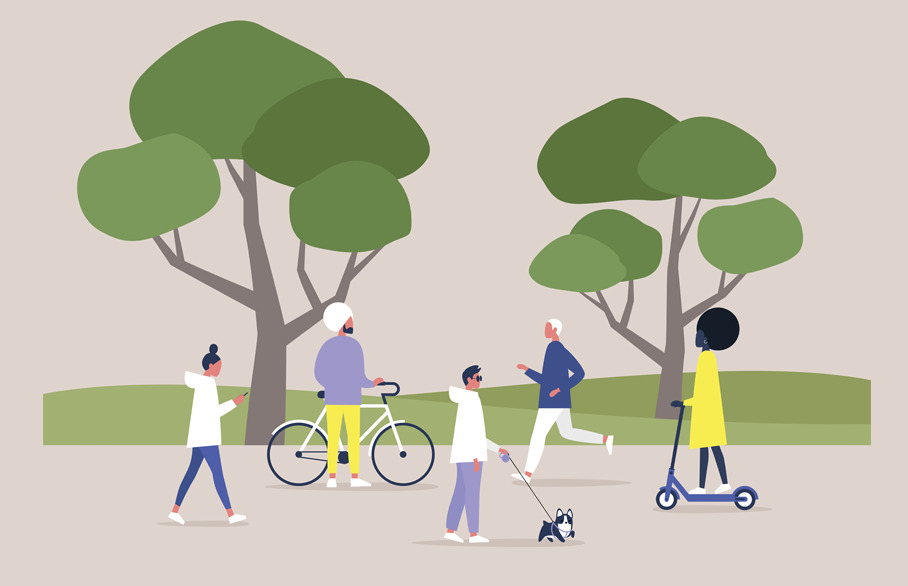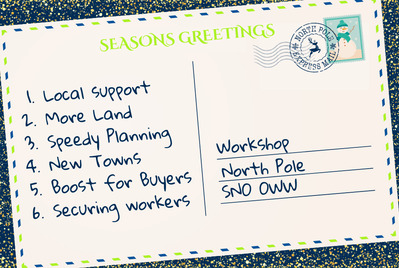
The annual COP conferences have become a familiar reminder of the increasing concerns we should all share about our planet’s welfare, a reminder than the housing sector needs to heed at least as much as others. There are various ways that homes themselves can be built in more sustainable and less polluting ways, but the power of housing goes beyond the construction process.
Reducing the environmental impact of cars is of paramount importance to dealing with the climate crisis, despite the increase in electric vehicles, recommendations suggest a need to reduce traffic by up to 60% by 2030. That’s aside from other concerns related to the pollution cars produce, which has been linked to thousands of premature deaths in London. The reality is that car use revolves around the home, therefore the way homes and housing developments are designed has the power the reduce car use.
Communities can and have been designed to reduce traffic and increase walkability, with aims to create ’15-minute neighbourhoods’, where everyone is within a 15-minute walk of essential amenities, and people do not need to use their cars on a daily basis. Mixed use developments are the most obvious way of encouraging this, in examples such as the Public Health driven Healthy New Towns, where homes are built alongside, schools, shops and public services necessary for daily life. In major cities there have also been attempts to create ‘Low Traffic Neighbourhoods’ to reduce the effects of pollution, simple measures, like using bollards to create one way roads, have had the impact of reducing traffic in Lambeth by 25,000 car journeys a day.
Yet, there are smaller-scale considerations which can also have an impact. A development might be located near a bus-stop or train station, but to maximise this benefit, the development needs to be designed so that pedestrian access is easy and safe, with wide pavements, useable crossings instead of obstructive mini-roundabouts, and short blocks that make routes easy and convenient. Even decisions made inside the home could make a key difference, with working from home now more common, designated workspaces can make that option preferable to a polluting commute.
Of course, cars are still essential for many, and giving up car use altogether would be unthinkable for most. Some developments are too small, or too out of the way to make a car free lifestyle realistic, and measures can sometimes just displace traffic. On that basis reducing parking spaces does not make sense as an option, it is likely that roads would become clogged with cars or much needed green spaces would be paved over. The point is, the carrot could come before the stick, incentivise and make a car free lifestyle easier, do not force people into it.
The reality is that creating walkable communities will have a myriad of benefits. Reducing pollution will have real term health benefits, as will a lifestyle with increased walking. Children will find it easier to get out the house if a development encourages walking. Some evidence even suggests a strong correlation between the walkability of a settlement and its value, as it encourages people to spend time in the community rather than shuttling to and from their driveways. Three quarters of home movers place local community on a list of important factors when looking for a home. So, as the world reflects on how to work for a sustainable future, considering walkable neighbourhoods would be a very positive step.
Sources
• Building – The drive towards car-free communities
• The Prince’s Foundation – Walkability and Mixed-Use, Making Valuable and Healthy Communities
• Inside Housing – How can housing providers hit new homes targets and create healthy communities for the future?
• Friends of the Earth Policy – Planning for less car use
• Dataloft - The Importance of Community
• Rapid Transition – Making streets people friendly: the rise of car free communities

Our experienced land & new homes experts can provide you with the knowledge & expertise that you need.



